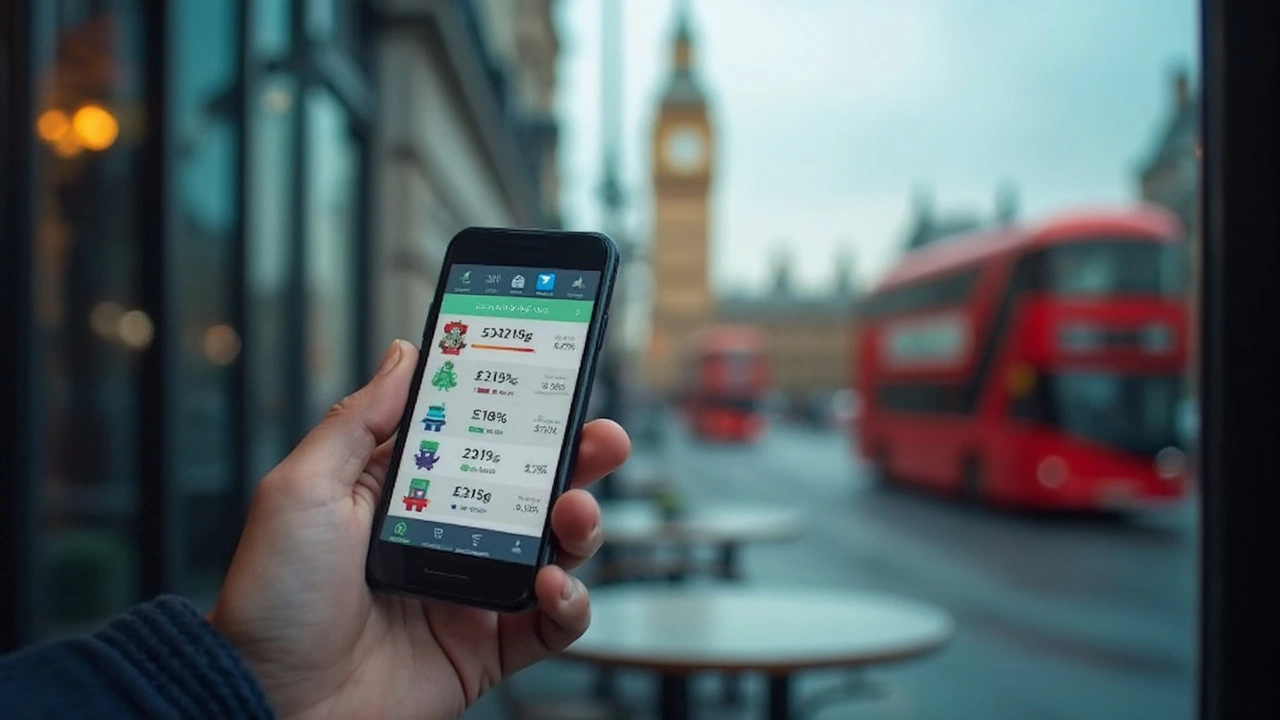Sick of juggling multiple bills and wondering if your bank can just help you bundle everything together? You're not alone. Debt consolidation is something lots of folks think about when monthly payments start piling up, and it’s not just the stuff of TV commercials. Yes, plenty of big banks and community banks do offer debt consolidation loans—usually as personal loans you can use to pay off higher-interest balances like credit cards or store lines.
Here’s what’s cool: going through a trusted bank for a consolidation loan can sometimes land you lower interest rates if your credit’s decent. Plus, banks might offer a bit more guidance than sketchy lenders you find online. But banks aren’t handing these loans out to just anyone. You’ll want to get a sense of their rules and how your credit and income stack up before you apply. It saves a ton of time (and awkward rejection).
- Can You Get Debt Consolidation Loans from Banks?
- How Bank Debt Consolidation Loans Work
- Getting Approved: What Banks Look For
- Tips for Choosing the Right Bank Loan
- Common Pitfalls and How to Dodge Them
Can You Get Debt Consolidation Loans from Banks?
Absolutely, you can get debt consolidation loans from banks. Most big names—think Wells Fargo, Citi, Bank of America, and regional banks like PNC or Fifth Third—offer personal loans that work for debt consolidation. What they're doing is giving you a single lump sum, which you then use to pay off credit cards, store cards, or smaller high-interest loans.
One thing to remember: banks rarely advertise a product called a "debt consolidation loan" specifically. Instead, they pitch it as an unsecured personal loan. The bank doesn't lock down your car or house to back the money, so they're mainly looking at your credit score and income.
Here’s a quick look at what’s typical:
| Bank | Loan Amount Range | Rates (2025) | Max Term |
|---|---|---|---|
| Wells Fargo | $3,000–$100,000 | 7.49%–23.74% APR | 7 years |
| PNC Bank | $1,000–$35,000 | 7.49%–25.49% APR | 5 years |
| Citi | $2,000–$30,000 | 8.99%–23.99% APR | 5 years |
Most major banks require you to be a current customer to apply online or get their best rates. If you’ve never had an account with a certain bank, you might have to apply in person or meet extra requirements. Some banks even deny loans if your debt-to-income ratio is too high (usually over 40%).
The big draw with using a bank? Stable payments. You get one payment each month, usually at a fixed rate, which helps with budgeting. And those interest rates often beat your standard credit card rate, especially if you’ve got good or excellent credit (that usually means a score above 670). But if your credit is shaky, banks are known to be cautious—or just say no. So it pays to check your own situation before applying.
How Bank Debt Consolidation Loans Work
So how does a debt consolidation loan from a bank actually do its job? Here’s the deal: you borrow enough money in the form of a personal loan—sometimes the bank even calls it a debt consolidation loan—to pay off pesky high-interest debts like credit cards, medical bills, or small personal loans. When you get approved, the bank cuts you a check or deposits the money into your account, and you use it to wipe out the balances you want gone. Boom, instead of five different payments, you now just owe the bank one monthly payment, usually at a lower rate.
Most banks set these up with fixed interest rates. That means your payment stays the same every month, making it way easier to plan your budget. The typical repayment term runs from 2 to 7 years, but you can ask about options. Major players like Wells Fargo, Discover, and US Bank all offer this kind of loan. Not every bank has a special debt consolidation label, but basically, any unsecured personal loan can be put toward consolidating debt.
“Consolidating debt with a personal loan can cut your interest by half or more compared to credit cards,” says Matt Schulz, Chief Credit Analyst at LendingTree.
Banks do a credit check and look at your income. They’ll want to see that you have the cash flow to cover the new payment, and they won’t approve you if your credit score’s in the basement. Expect interest rates that range anywhere from 7% to 24% depending on your credit, but if you’ve been getting crushed by 28% or 30% credit card rates, it’s still a relief.
Here’s what usually happens in steps:
- You apply with details about your debts and income.
- The bank checks your credit and decides if you qualify, and how much they can lend you.
- If approved, you get the money. Some banks pay your creditors directly.
- You pay off your original debts (if the bank doesn’t do it for you).
- You start making monthly payments to the bank until the loan is paid off.
Just keep in mind, banks do sometimes charge origination fees (anywhere from 1% to 8% of the loan amount), so ask about that before signing anything.

Getting Approved: What Banks Look For
Banks aren't just tossing out debt consolidation loans to anyone who walks in. You’ve got to tick a few boxes first. Let's break down what really matters when a bank looks at your application, so you have a fighting chance.
The biggest thing banks care about is your credit score. Many well-known banks set the cut-off at around 660 or higher, but some might dip a bit lower, especially if you’re an existing customer. If your score’s under that, it doesn’t mean you’re out of luck, but it’s definitely tougher—think higher interest or smaller loan offers.
Next is your income. Banks don’t want to give money to someone who can’t pay it back. They’ll usually ask for pay stubs or tax returns to check that your income is steady. Most want to see you earn at least $20,000 to $30,000 a year, but more income can land you bigger loans or better rates.
Debt-to-income (DTI) ratio is another biggie. Basically, banks look at how much you already owe versus what you make each month. A DTI under 40% is usually good news. Too high, and banks might think you’re living on the edge.
| Factor | Typical Requirement |
|---|---|
| Credit Score | 660+ |
| Stable Income | $20,000/year or more |
| Debt-to-Income Ratio | Under 40% |
One more thing that matters: your history with the bank. If you’ve been a good customer—say, your bank account’s always in the black, and you’ve had a loan before—you might get a little more wiggle room.
- Tip: Pull your credit report before applying. Fix mistakes so you don’t end up getting rejected for something dumb.
- Make sure your income paperwork is up to date.
- Don’t apply for a bunch of loans at once—each hard check can ding your credit.
Bottom line: The stronger your credit, income, and banking history, the better your odds of snagging a good bank debt consolidation loan.
Tips for Choosing the Right Bank Loan
So, how do you make sure you get the best deal when shopping for a debt consolidation loan at a bank? It’s not just about grabbing the first offer tossed your way. You need to know what to look out for and what actually matters.
- Compare interest rates, not just monthly payments. A lower monthly payment might look attractive, but if the interest rate is higher or the loan lasts much longer, you could end up paying way more overall. Banks often give rates based on your credit score—so if you have a score over 670, you’ll likely get better deals.
- Check for hidden fees. Some banks sneak in origination fees, prepayment penalties, or late charges. Always ask for a list of all fees before signing anything. For example, some big-name banks charge up to 5% just to process the loan. That adds up fast.
- Watch the loan term length. Shorter terms mean higher monthly payments but less paid in interest over time. Longer terms do the opposite. Figure out what you can really afford and use a loan calculator to see the difference.
- See if they offer direct payments to creditors. Some banks will send your consolidation loan funds straight to your other lenders. This sounds minor, but it’s a lifesaver if you tend to procrastinate or worry about missing a payment during the switch.
- Ask about perks for existing customers. Big banks (like Wells Fargo and Citi) sometimes give rate discounts to people with checking or savings accounts already open—nothing huge, but even 0.25% off adds up over years.
Want a quick way to compare offers? Here’s a handy table showing what to double-check:
| Bank | Typical Interest Rate (%) | Origination Fee | Prepayment Penalty | Rate Discount for Customers |
|---|---|---|---|---|
| Chase | 7.99–19.99 | None | No | Yes (varies) |
| Wells Fargo | 7.49–23.24 | Up to 5% | No | Yes (0.25–0.50%) |
| Citibank | 8.99–23.99 | None | No | Yes (0.25%) |
Bottom line: Don’t just look at the first number you see. Dig into the details before you say yes.

Common Pitfalls and How to Dodge Them
Signing up for a debt consolidation loan from a bank sounds like a clean fix, but some traps can turn it into an expensive headache fast. Knowing these danger zones means you can steer clear and actually get ahead.
First, don’t ignore the total cost. Banks will show off the lower monthly payment, but sometimes that just means you’re stuck paying a lot more in interest over the years. Always check the total amount you’ll repay.
- Hidden fees: Banks often charge origination fees, prepayment penalties, or late fees nobody talks about upfront. Read every line of the agreement.
- Collateral risks: Some banks only give the best rates if you use your house or car as collateral. If you miss payments, you could lose what you put up.
- High interest after missed payments: Fall behind and banks can slap you with penalty rates that basically undo your original savings.
- Messing with your credit score: Applying for new credit or closing paid-off accounts can ding your score. Opening several loan applications at once? That’s a red flag for banks and credit bureaus.
If you’re curious, here’s a quick look at common fees for personal loans at U.S. banks in 2024:
| Fee Type | Typical Range |
|---|---|
| Origination Fee | 1%–6% of loan amount |
| Prepayment Penalty | 0%–2% (only at some banks) |
| Late Payment | $25–$40 |
Here’s how to keep yourself safe:
- Read the entire loan offer—no skipping. Look for every fee and rule.
- Ask the bank to spell out exactly how much you’ll pay in total—including interest and all fees.
- Don’t put your home or car up as collateral unless you’re 100% sure you can handle the payments.
- Keep your spending in check after consolidating—if you rack up new credit card balances, you’re back at square one.
So, moving your debts isn’t a silver bullet. But if you’re sharp about bank offers and fine print, a bank debt consolidation loan can actually help you get back on track.

